Organized by McGill’s Office of Sustainability, Graduate and Postdoctoral Studies, and the Post-Graduate Students Society, Three Minutes to Change the World features McGill graduate students summarizing their research initiatives and highlighting the importance of their work to the community at large.

From left: Kartik Sameer Madiraju, Lysanne Rivard, Feng Qi, Marie Senécal-Tremblay, Saoussan Askar, Laura-Isobel McCall, Alexandra Fletcher, Sebastien Boridy, Dianah Msipa, and Janelle Marie Baker.
Watch the 2013 event where the following graduate students presented a three minute presentation appropriate for a non-specialist audience.
 Kartik Sameer Madiraju
Kartik Sameer Madiraju
Department of Bioresource Engineering, Master's candidate
"Microscopic Reactors for Macroscopic Change"
Microbial fuel cells (MFCs) are devices which use bacteria to consume organic material and produce electricity with the potential to become off-grid bioreactors useful all around the world, especially in developing nations. Their versatility is unparalleled. Kartik has used MFCs to treat wastewater, convert CO2 to electricity, and yield hydrogen gas fuel. The biggest obstacle to implementing MFCs worldwide is predicting their performance at larger scales—his graduate research aims to resolve this roadblock. In three minutes, he shares the highlights of his nine-year journey with MFC technology and its potential for sustainable, carbon neutral power and clean water.
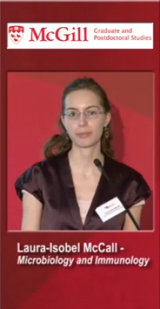
Laura Isobel McCall
Department of Microbiology and Immunology
"Live Vaccination Against a Deadly Disease: Targeting Visceral Leishmaniasis"
Billions of people are infected with parasites many eventually die of these diseases, and yet there are no human vaccines available against parasitic disease. Laura-Isobel McCall looks to develop a naturally attenuated vaccine – meaning a vaccine developed from a related milder disease that would protected against more severe diseases. This naturally attenuated parasite will need many more changes before it is suitable for humans, but it does represent a step forward in the study of naturally attenuated live vaccines against a deadly parasitic infection.

Dianah Msipa
Department of Law
"Competency Assessments: A Barrier to Access to Justice?"
The testimonial competence of complainants with intellectual disabilities is often challenged necessitating a trial within a trial to determine the complainant’s competence. Dianah's research evaluates criminal evidence rules relating to competency assessments as well as the manner in which they are carried out by the judiciary in relation to complainants with intellectual disabilities. In particular she will evaluate whether the requirement for a witness to demonstrate an understanding of an oath or promise in order to be deemed competent to testify acts as a barrier to access to justice protected under the Convention on the Rights of Persons with Disabilities.
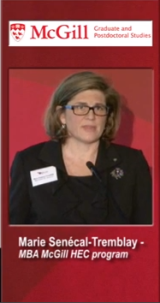
Marie Senécal-Tremblay
MBA McGill HEC program
"Microscopic Reactors for Macroscopic Change"
In 2002, in both Norway and Canada, women represented less than 10% of corporate board members. Norway and Canada undertook initiatives to address the gender gap. Canada adopted voluntary actions. Norway adopted voluntary action combined with legislative action. In 2012, Norway has 40% of women on boards while Canada remains stagnant at 14%. Marie Senécal-Tremblay looks to find a ‘made-in-Canada’ solution to the development of positive-impact, effective legislation with the fewest unintended side effects.
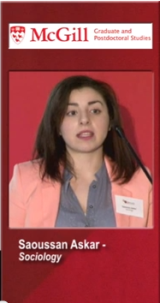
Saoussan Askar
Department of Sociology
"The Discursive Properties of HIV/AIDS in Arab Middle Eastern Popular News Media"
The focus of Saoussan's research is on exploring the discursive properties of HIV/AIDS in Arab Middle Eastern popular news media. Understanding the discourses surrounding HIV/AIDS illuminates how this illness becomes a site around which various fears and moral narratives are asserted. The ultimate goal is to contribute an understanding of the broader socio-cultural meanings associated with HIV/AIDS in the Middle East. This work can serve to build a bridge to allow for education, treatment and prevention policies appropriate for the cultural context of the Arab Middle East.

Sebastien Borldy
Department of Pharmacology and Therapeutics
"Nanoparticles to Treat Brain Disorders: Thinking BIG about Something Small"
Advances in nanotechnology and biomaterials have allotted us with the opportunity to overcome this challenge by designing “smart” drug delivery systems that can sense and pinpoint injuries when and where they happen. Therefore, drugs accumulate at the site of injury, in turn, reducing side effects incurred by drug activity at off-target sites. Moreover, we can design such systems to cater to individual patient needs, creating a prominent avenue for personalized medicines. Sebatien laboratory team focuses on applying this research to improve the treatment and diagnosis of debilitating brain disorders, such as Alzheimer’s disease, stroke, and brain tumours. By employing such methods, they are hoping to improve the health of Canadians by developing smarter and more reliable medicines.
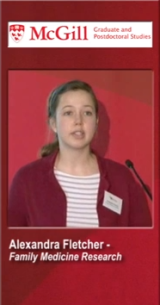
Alexandra Fletcher
Department of Family Medicine
"Participatory Research: What’s in it for me?"
Advances in nanotechnology and biomaterials have allotted us with the opportunity to overcome this challenge by designing “smart” drug delivery systems that can sense and pinpoint injuries when and where they happen. Therefore, drugs accumulate at the site of injury, in turn, reducing side effects incurred by drug activity at off-target sites. Moreover, we can design such systems to cater to individual patient needs, creating a prominent avenue for personalized medicines. Sebatien laboratory team focuses on applying this research to improve the treatment and diagnosis of debilitating brain disorders, such as Alzheimer’s disease, stroke, and brain tumours. By employing such methods, they are hoping to improve the health of Canadians by developing smarter and more reliable medicines.
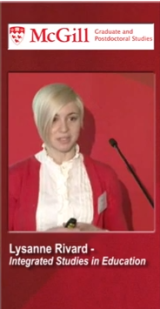
Lysanne Rivard
Department of Integrated Studies in Education
How can girls be integrated into the decision-making process concerning the improvement of the physical activity and sport programming they experience? Using the visual participatory methodology Photovoice, this case study gathered Rwandan girls’ perspectives on their lived experiences of physical activity and sport in secondary schools. Approximately 200 girls photographed their feedback, concerns and suggestions to improve programming. The photographs and captions were then presented to and served as the basis for semi-structured interviews with three levels of targeted Rwandan stakeholders: the girls’ physical education teachers, gender and physical education experts and three ministries: Education, Sports and Gender and Family Promotion.

Feng Qi
Department of Chemistry
"Acceleration of Nature’s Green Strategy for Material Synthesis and Mineral Processing"
Accelerated aging implements the principles of Green Chemistry and atom economy by using inexpensive and abundant starting materials, and avoiding excess reagents, high temperatures and organic solvents. The materials already explored in Feng's research resemble those encountered in ore concentrates, indicating the opportunity to develop a cleaner technology for mineral processing and metal extraction. In the laboratory, their methodology has been scaled to 10 gram amounts, with no obvious obstacles for further scaling up.

Janelle Marie Baker
Department of Anthropology
"First Nations’ Indicators for Wild Food Contamination in the Oil Sands"
Janelle researches First Nations’ indicators for wild food contamination by exploring how their knowledge and beliefs about the environment informs the concept of contamination in the oil sands region in northern Alberta. This concern about contaminated food is profoundly disruptive in socio-ecological terms for First Nations. Janelle uses anthropological methods (such as community-based research, participant observation and interviews) to elicit explicit renditions by harvesters of their diagnostics and perspectives for food quality and contamination. This research will lead not only to a better understanding of the changes in plant and animal populations that First Nations are observing as a result of industrial development; it will document their changing relationship with these populations in this development context.